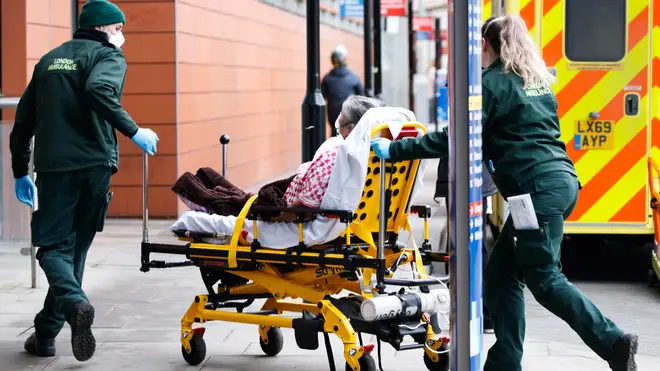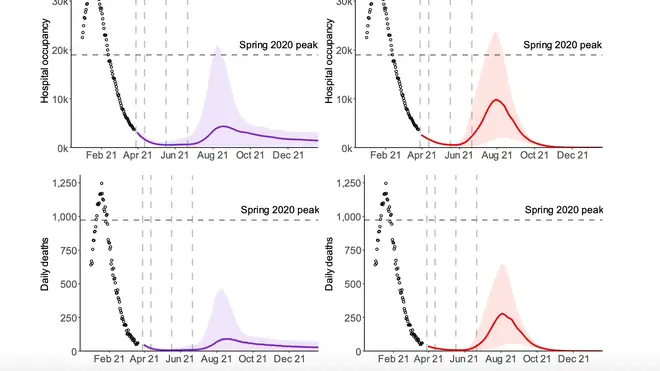
Shelagh Fogarty 1pm - 4pm
6 April 2021, 15:22 | Updated: 7 April 2021, 08:48

Daily coronavirus deaths should stay below 100 even if there is a resurgence of Covid-19, new modelling by Imperial College London has suggested.
An increase in hospital admissions and deaths is "highly likely" during the later stages of the UK's road map out of lockdown, new documents based on three separate modelling documents have shown.
The information from Imperial, the London School of Hygiene and Tropical Medicine and University of Warwick, has been assessed by the Scientific Pandemic Influenza Group on Modelling (Spi-M), which advises the Government.
READ MORE: SAGE scientists warn of third Covid wave if lockdown eased as planned in May and June
READ MORE: All pupils in Scotland to return to school after Easter, Sturgeon confirms
All the modelling predicts a third wave once the fourth and final stage in lockdown easing has been completed, but with varying degrees of severity.
With several assumptions taken into account, including very high vaccine uptake and no waning immunity or escape variants, Imperial experts predict deaths will not increase above 100 in an expected third wave.

However, London School of Hygiene and Tropical Medicine (LSHTM) projections suggest lifting restrictions completely in June could "lead to a larger surge of cases and deaths comparable to that seen during the first wave".
They cautioned their findings were "preliminary" and made "pessimistic assumptions" about the later stages of the road map.
Warwick scientists shared a similar conclusion that a "distinct third wave of infection" would arise due to the current rate of planned unlocking, with hospital admissions peaking between late July and mid-August.
In a round-up of the findings, Spi-M concluded that in a resurgence in infections, hospital admissions and deaths will occur but point to a lot of uncertainty in the predictions.

Vaccine passports 'going to be fact of life' for overseas travel
"The scale, shape, and timing of any resurgence remain highly uncertain," it said, adding that "in most scenarios modelled, any peak is smaller than the wave seen in January 2021", though could reach a similar scale if there is little reduction in virus transmission by June.
It said: "Maintaining baseline measures to reduce transmission once restrictions are lifted is almost certain to save many lives and minimise the threat to hospital capacity.
"Even accounting for some seasonal variation in transmission, the peak could occur in either summer or late summer/autumn. It is possible that seasonality could delay or flatten the resurgence but is highly unlikely to prevent it altogether."
Spi-M said the resurgence in both hospital admissions and deaths "is dominated by those that have received two doses of the vaccine, comprising around 60% and 70% of the wave respectively".
It said these will be in the most at-risk age groups, "such that immunisation failures account for more serious illness than unvaccinated individuals".
While the current vaccines offer a high level of protection, they do not work perfectly for everyone. Regardless, continued uptake is encouraged by governments and health agencies as the best way of combatting Covid-19.

Will the Oxford jab roll out be halted? LBC ask Vaccines Minister
Spi-M also predicts deaths among the unvaccinated, with some experts having said previously they are the most at-risk group.
Dr Mike Tildesley, from the University of Warwick and a member of Spi-M, earlier told LBC "there may well be" a third wave in the UK but probably not as high as some modelling predicts.
He told Nick Ferrari: "I think we do have very high levels of vaccination now, we do need to remember this, we are protecting our vulnerable.
"But the vaccines are not 100% protective so when we switch from an R number less than 1 that we have at the moment, to a lot of mixing later on, we may get a resurgence.
"I don't expect we will have a resurgence of the same scale that we saw in January.

Dr Mike Tildesley on whether lockdown easing can be 'sped up'
"So then there needs to be some very serious questions asked. If we do see a rise in cases, if we do start to see hospital occupancy go up a little bit, are we going to put in controls or is it something that we're just going to try to manage with local testing and so forth?
"I think that's the question the Government are going to potentially have to answer as we get towards the summer."
He added there could also be some arguments for lifting restrictions in the road map sooner.
He said: "I was really pleasantly surprised that when schools open we have managed to keep things in check, so I think... if these numbers keep going down over the next few weeks there certainly is an argument to say 'well actually we're doing really well with the road map, it could be sped up.'
"I would say I would want to be a little bit cautious over the next few weeks as we get beyond this April relaxation to monitor that just to be really sure that cases are continuing to go down."